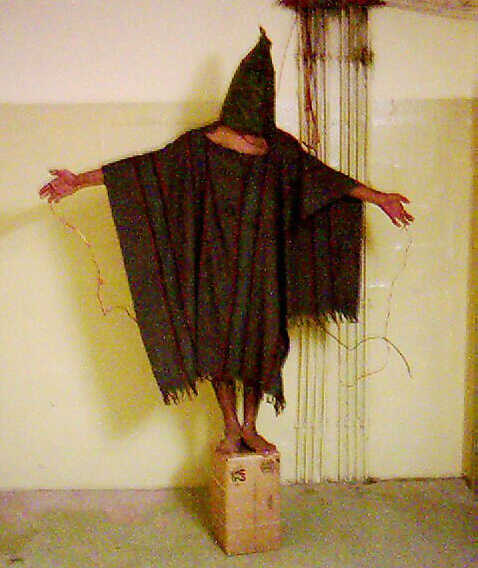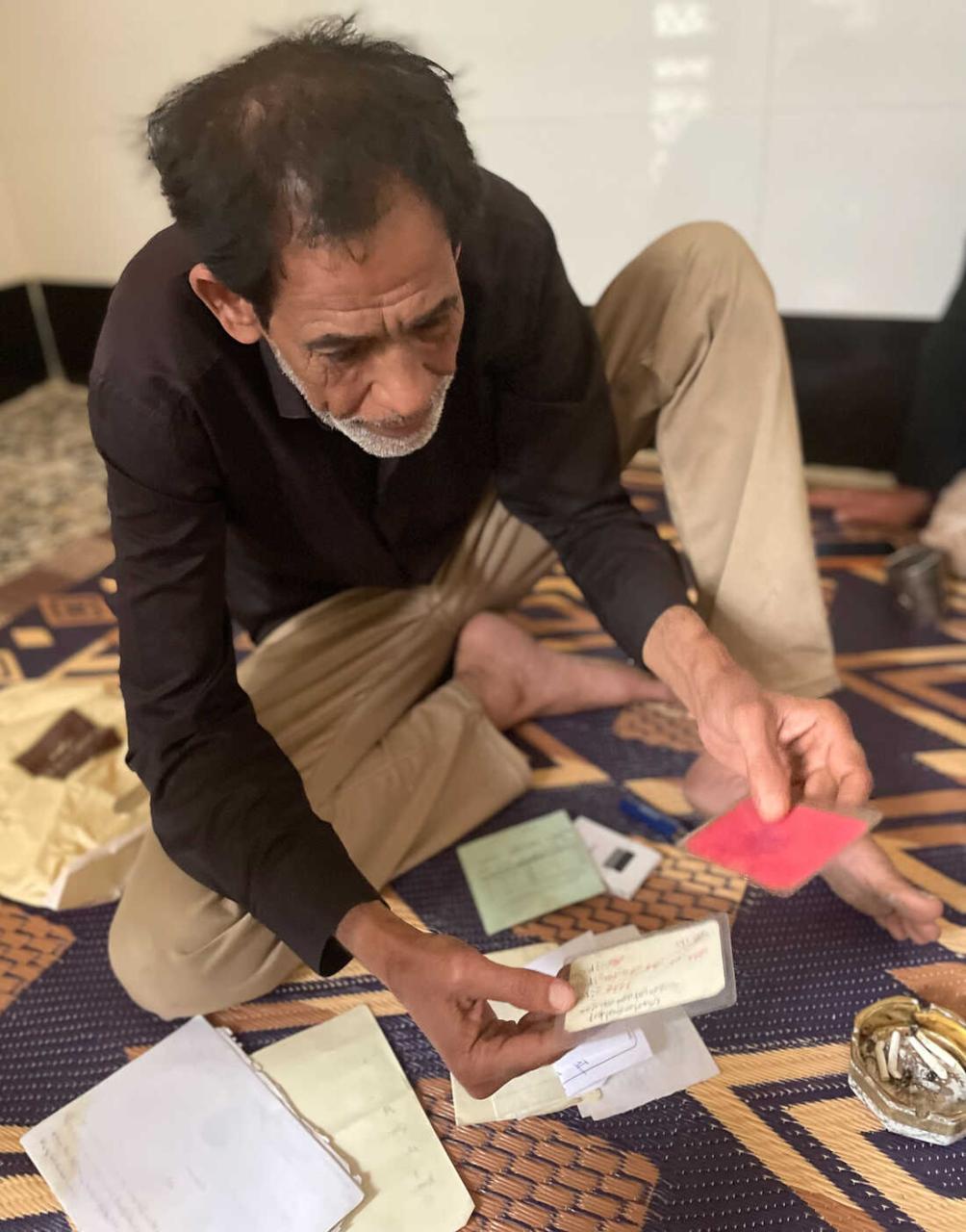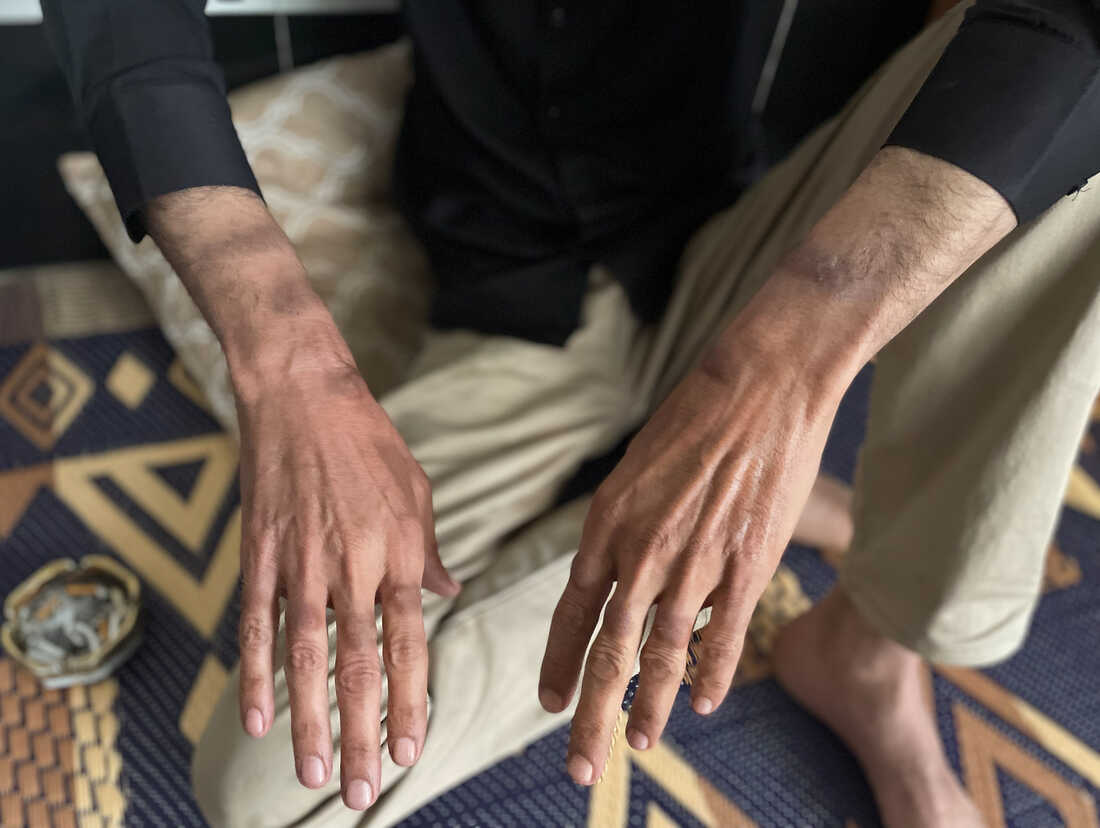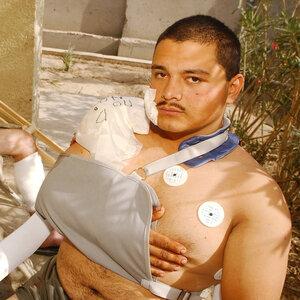He says U.S. troops abused him in Iraq’s Abu Ghraib and his life is still ruined
Talib al-Majli, 57, lives in a poor area in Baghdad. He says his detention in Abu Ghraib prison left him destitute and too physically weak and psychologically traumatized to find a reliable job. Now he works odd jobs, sometimes putting up signs for companies, earning around $30 per week.
Ruth Sherlock/NPR
Editor’s note: This story contains descriptions and images of abuse.
BAGHDAD — It’s been almost two decades since he was released from Abu Ghraib prison. But it could have been yesterday. Desperately thin, with dark circles around his eyes, Talib al-Majli bites at the skin of his wrist, a nervous tic he developed in the prison.
Majli, 57, can recall in detail the torture he says he endured by U.S. soldiers during the 16 months he was held in the notorious prison in Iraq. He was never charged with anything — one of the thousands of men swept up in U.S. forces’ house raids following the invasion in 2003, most of them detained by mistake, according to military intelligence officials cited in an International Committee of the Red Cross report on the detentions. Almost two decades later, the Abu Ghraib detention has ruined him.
“To this day I feel humiliation for what was done to me,” he says. “The time I spent in Abu Ghraib — it ended my life. I’m only half a human now.”
The imprisonment has left him destitute and too physically weak and psychologically traumatized to hold down a job, he says. His wife left him, taking their two daughters with her. His sons were so badly bullied in school over the abuse their father had endured that they dropped out, never finishing their education. Now they and their father live in a home of two rooms and an outside toilet in a poor neighborhood in Baghdad.
The abuse of detainees by U.S. soldiers in Abu Ghraib prison is one of the grim legacies of the Iraq War. Photographs leaked in April 2004, and broadcast from newsrooms around the world, show men stripped naked and leashed like dogs or forced into contorted or sexual positions, with U.S. forces posing gleefully with them.
In one image, naked detainees with bags over their heads are piled on top of each other in a grotesque human pyramid. An American soldier — Sabrina Harman — leans over them from behind, grinning. Her smiling colleague, Charles Graner, gives a thumbs up.
Majli believes he is one of the men in the human pyramid photograph. He remembers being forced to lie, naked, on the bare skin of another prisoner, and the feeling of being crushed as other naked detainees were piled on top of him. “I was heavier back then, so they put me close to the bottom,” he remembers. “I wished for death. I would rather have been dead than to be in that position.”
An image obtained by The Associated Press shows an unidentified detainee standing on a box with a bag on his head and wires attached to him in late 2003 at the Abu Ghraib prison in Baghdad, Iraq.
AP
“Different types of torture”
Majli describes a culture of abuse and humiliation inside Abu Ghraib. He remembers an American soldier threw sound grenades into his and other detainees’ cells. He recalls guards poking at his genitals with wooden sticks, setting snarling police dogs on inmates and soldiers firing live ammunition around them. Majli says he developed pneumonia after guards flooded his cell with cold water as a tactic to stop the prisoners from getting rest. “They wouldn’t let us sleep for days.”
“There were different types of torture,” he says. “They completely destroyed us psychologically.”
Majli still has a card showing his prison ID and other documents that confirm his time in Abu Ghraib. Detained on Oct. 31, 2003, he was marked as prisoner No. 152516.
Majli says American forces detained him in a village in western Iraq’s Anbar province, where he was visiting his uncle. U.S. soldiers arrived, asked for people’s IDs and rounded up many of the men there. “Without any discussion, they put a bag over my head and took me away,” he says.
“In the first days in Abu Ghraib, I cried. I kept thinking of my children and praying that I’d be released soon. I was innocent, so I thought I would be out in a few days,” Majli says.
Talib al-Majli, 57, shows documents confirming his detention in Abu Ghraib prison beginning on Oct. 31, 2003.
Ruth Sherlock/NPR
But the days turned to weeks and then months.
Majli swears he never took part in the insurgency against the U.S. or committed any other crime. When he was eventually released, a year and four months later, he says the American officer handling his case was confused about why he’d been held because there were no charges in his file. A document Majli later obtained from the Iraqi Ministry for Human Rights confirms there is a record of his detention in Abu Ghraib, but it gives no reason for his imprisonment.
Military intelligence officers from U.S.-led coalition forces in Iraq later told the International Committee of the Red Cross that between 70% and 90% of Iraqis detained after the U.S. invasion were actually arrested by mistake, according to a leaked confidential ICRC report. And now the military says it cannot locate the records identifying any of the detainees.
When the U.S. invaded Iraq in 2003, Majli was happy, he says. He was 37-years-old, living in Mosul and trying to support his wife and their four young children on the meager salary he earned as a foot soldier in the Iraqi army. He says tough U.S. economic sanctions and the instability and fear caused by Saddam Hussein’s wars with Iran and Kuwait had made their lives miserable. Majli wanted Saddam gone.
“Before I was detained in the American prison, if I’d seen George Bush, I would have thanked him with all my heart and welcomed him to Iraq,” he says. “But his good deed became my curse.”
A life destroyed
When Majli walked out of Abu Ghraib in February 2005, he says, he was penniless and physically and emotionally broken. He suffered nightmares and felt uncontrollable rage for what had been done to him. Almost worse than the torture itself, Majli says, was the humiliation of his community knowing the degrading treatment he’d suffered.
Talib al-Majli shows scars on his arms from where he bites his own skin. It’s a nervous tic he says he developed in Abu Ghraib that continues to this day.
Ruth Sherlock/NPR
Everyone saw the photographs published of the abuses in Abu Ghraib. Even though Majli is a victim — and survivor — of abuse far out of his control, he says his community attached a stigma to him and his family. Eventually, Majli says, his wife couldn’t cope with it. “She divorced me because of what happened to me in the prison and the scandal of it,” he says.
Majli says his wife took their two daughters with her. Their two sons remained with him and they moved to a different part of Baghdad to try to make a fresh start. But eventually neighbors again learned about his time in Abu Ghraib. That’s when Majli says his children left school for being bullied. They moved to another house again.
Majli speaks with NPR, sitting on a thin plastic mat covering the cold tile floor of his two-room apartment in Baghdad. During the day, the bedding is piled on top of a small wooden cupboard in the corner. The toilet is in a cinder-block cubicle outside. Gaps in the roof mean the rain runs down the interior walls. Outside, water pools on the mud street that has no proper drainage.
This is all Majli can afford. He does odd jobs, sometimes earning around $30 per week to put up advertisement posters for a company.
Majli says his health has never recovered from his time in Abu Ghraib. He has no money to visit a doctor and so has never received a diagnosis. But he says he struggles to put on weight, feels physically weak and has little energy to be able to work.
No U.S. compensation
In the United States, 11 soldiers were eventually convicted in 2006 of crimes at Abu Ghraib. Lynndie England, one of the soldiers who Majli says abused him, was sentenced to three years in prison for charges including committing an indecent act and maltreating detainees.
But Majli says he and other Iraqis abused in Abu Ghraib need financial compensation so they can build back their lives.
In the months and years after his release, Majli says he tried to obtain payment from the U.S. military for what he went through. He couldn’t afford a lawyer and didn’t know how to seek compensation, so he went to the Iraqi Bar Association in Baghdad in search of advice. But he says they only told him they didn’t deal with these kinds of cases. He then sought help from the Iraqi Ministry for Human Rights. They wrote him a letter confirming they had him in their system as a former prisoner of Abu Ghraib, but said that’s all they could do.
He didn’t know where else to turn. It’s possible there was nowhere for him to go. Baher Azmy, a lawyer with the Center for Constitutional Rights in New York, believes “no administrative mechanism was ever set up” in Baghdad to seek justice for victims of abuse by U.S. soldiers.
Almost 20 years on, none of the men who appeared in those photos that shocked the world has ever been compensated by the U.S. military for the mistreatment they suffered in Abu Ghraib.
Comment: Somebody who talked with this guy and knows where he lives should put up a fundraiser for him. He desperately needs the money and his sons deserve some kind of educational support too.
Related posts:
Views: 0
 RSS Feed
RSS Feed

















 November 4th, 2023
November 4th, 2023  Awake Goy
Awake Goy 






 Posted in
Posted in  Tags:
Tags: 
















